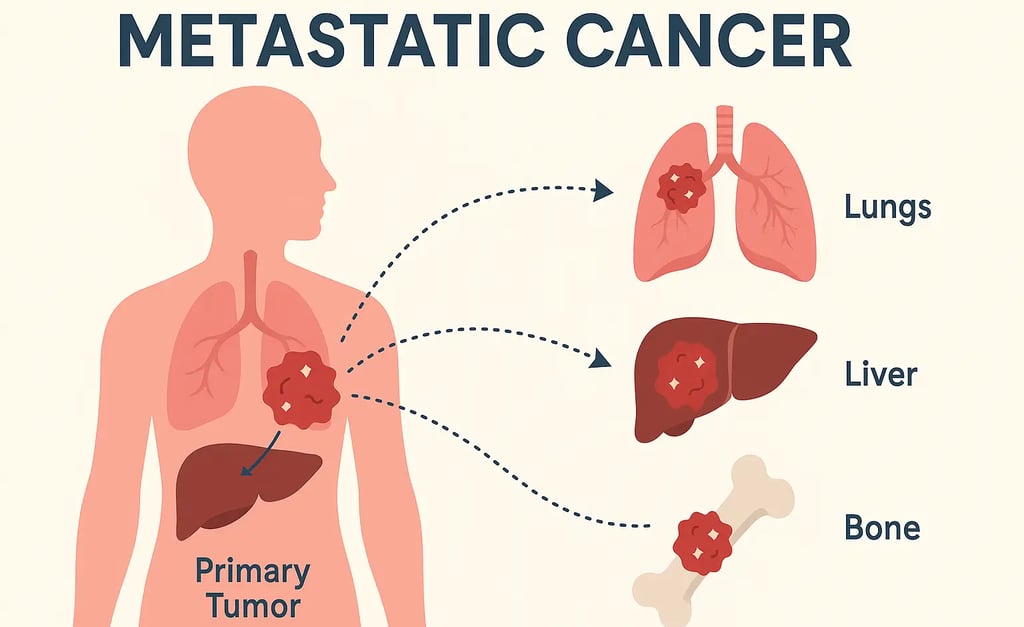What Is Metastatic Cancer? Causes, Symptoms, Prevention & Support Guide
Learn what metastatic cancer is, how it spreads, common symptoms, prevention strategies, and support resources for coping. A complete guide to understanding advanced cancer.


What Is Metastatic Cancer? Causes, Symptoms, Prevention & Support Guide
Metastatic cancer is an advanced form of cancer in which malignant cells spread from the primary tumor to other parts of the body. Unlike localized cancer, metastatic cancer arises when cancerous cells break away from their origin and travel through the bloodstream or lymphatic system to form new tumors in distant organs or tissues. This process, known as metastasis, indicates a more serious stage of the disease.
You can learn more about the fundamentals of cancer development in our post: How Cancer Starts and Spreads.
The metastatic process involves several critical steps. First, cancer cells detach from the original tumor and invade nearby tissues. They then enter the bloodstream or lymphatic system, travel to distant parts of the body, and begin growing in new environments. The ability to metastasize makes cancer more aggressive and difficult to treat.
Certain types of cancer are more likely to metastasize. For example:
Breast cancer often spreads to the bones, liver, and lungs
Lung cancer may spread to the brain, liver, and bones
Prostate cancer commonly spreads to the bones
Colorectal cancer often spreads to the liver or lungs
Learn more about the early signs of cancer you shouldn’t ignore to catch issues before they progress.
For a scientific overview of metastatic cancer, visit the American Cancer Society or explore the National Cancer Institute’s guide .
Signs and Symptoms of Metastatic Cancer
Symptoms of metastatic cancer vary based on where the cancer has spread. Recognizing these early can improve the chances of timely diagnosis.
Common metastatic sites and symptoms:
Bones: Persistent pain, fractures, or swelling
Liver: Abdominal pain, jaundice, unexplained weight loss
Lungs: Chronic cough, shortness of breath, coughing blood
Brain: Headaches, seizures, vision or speech problems
General warning signs:
Unexplained fatigue
Significant weight loss
Weakness or physical decline
Neurological symptoms
Because these symptoms can resemble other less serious conditions, it’s essential to consult a healthcare provider if they persist.
You can read our guide to the best cancer screening tests to know in 2025 for proactive health monitoring.
How to Prevent Metastatic Cancer: Key Lifestyle Strategies
While not all cancers are preventable, lifestyle modifications can lower the risk of cancer and potentially stop it from spreading.
1. Eat a Cancer-Preventive Diet
Include:
Fresh fruits and vegetables
Whole grains
Lean proteins
Anti-inflammatory foods like turmeric, tomatoes, and green tea
Antioxidants from berries, nuts, and leafy greens
2. Exercise Regularly
Engage in at least 150 minutes of moderate aerobic exercise per week. Exercise:
Boosts immunity
Helps maintain a healthy weight
Reduces inflammation
3. Avoid Tobacco and Limit Alcohol
Stop smoking—it’s the top risk factor for many cancers
Limit alcohol to reduce risks of breast, liver, and throat cancer
4. Get Regular Screenings
Detect issues early with routine screenings. These might include:
Mammograms
Colonoscopies
PSA tests
Pap smears and HPV tests
Your doctor can guide you based on age, gender, and family history.
5. Strengthen Immune Health
Sleep 7–9 hours per night
Manage stress with yoga or mindfulness
Stay hydrated
Consider vaccinations like HPV and hepatitis B
The World Health Organization (WHO) also provides global recommendations on cancer prevention.
Coping with Metastatic Cancer: Emotional & Physical Support
A metastatic cancer diagnosis can be emotionally challenging. Fortunately, there are many support systems to help you cope.
1. Mental Health Support
Seek therapy or counseling at cancer centers
Join support groups for shared experiences
Talk to oncology social workers or therapists
2. Physical & Occupational Therapy
Regain strength and mobility
Manage fatigue and side effects
Improve independence in daily tasks
3. Complementary Therapies
Consider:
Acupuncture
Massage
Meditation or yoga
These holistic options can complement your treatment and reduce stress.
4. Community & Online Resources
Lean on family and friends for support
Join local or online cancer communities
Use resources from trusted organizations like:
Connecting with others and accessing resources can foster a sense of hope and resilience.
Conclusion
Metastatic cancer represents an advanced stage of the disease but understanding its symptoms, risks, and support systems can help patients and families manage it more effectively. Early detection, healthy lifestyle choices, and comprehensive care strategies play a crucial role in improving outcomes.
If you or someone you know is facing metastatic cancer, remember: support is available, and taking a proactive approach can make a meaningful difference.
